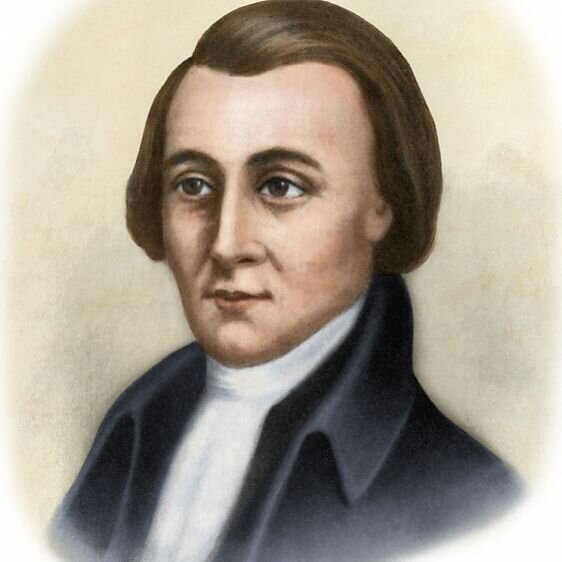
Matthew Thornton
New Hampshire
Matthew Thornton could weave a tale of delight and adventure for the after-dinner crowd. With great inventiveness, he would hold his audience captive with his oral entertainment. And perhaps, his own life was part of his inspiration for the storytelling.
Matthew Thornton was born on March 3, 1714. Three years later, his Scotch-Irish family left Ireland sailing the Atlantic to America’s shores. The family settled in what was to become the state of Maine. In the late 16th and 17th centuries, the territory was in constant upheaval as the British battled various Indian nationalities. In 1722, the battle came to the literal doorstep of the Thornton residence near Brunswick (or possibly Wiscasset). While Indians were attacking the British settlement, the house caught fire and the family escaped by canoe and made their way to the Casco Bay.
The family relocated to Worcester, Massachusetts where the young Thornton received a quality education at Worcester Academy. In time, he studied medicine under the guidance of a relative, Dr. Grout, in Leicester. When he was 26 years old, Mr. Thornton began practicing medicine in another Scotch-Irish town, Londonderry, New Hampshire. It did not take long for his reputation to grow as a competent physician and surgeon. And this led to his selection as a delegate to the colony’s assembly in 1758. Eventually, he became president of the assembly.
Beginning in 1760, Dr. Thornton became quite engaged in New Hampshire politics and in protesting “unconstitutional and tyrannical Acts of the British Parliament.” From 1775-76, he held numerous offices including president of the state constitutional convention, a member of both the lower and upper houses of legislature, and speaker of the legislature.
Matthew Thornton’s belief in the good and the importance of Christianity is seen in his address to his fellow colonists in 1775. After the royal governor was forced to flee the province of New Hampshire, a provincial convention was convened and Dr. Thornton presided over it. During one session, he addressed the gathering, “… We would, therefore, recommend to the colony at large, to cultivate that Christian union, harmony, and tender affection, which is the only foundation upon which our invaluable privileges can rest with any security, or our public measures be pursued with the least prospect of success.” At the end of his life, Dr. Thornton wrote a book manuscript on the beginning of evil, “Paradise Lost; or, the Origin of the Evil called Sin.” The manuscript was never published.
In September of 1776, a month after the formal signing of the Declaration of Independence, he was selected to represent New Hampshire at the Second Continental Congress. He joined proceedings in November and due to being held in such high esteem was permitted to sign the Declaration. While a congressional delegate, he began serving as the chief justice of the Court of Common Pleas in his home state. He served until 1782 and after a little over a year’s time in Congress, he returned home to resume his associate justiceship of the Superior Court. He also served in the state Senate from 1784 to 1786.
In his later years, Matthew Thornton farmed and operated a ferry. In his eighties, his powerful mind continued to churn and he wrote newspaper essays and letters on many topics. He died on December 24, 1803.
Matthew Thornton lived to be 89 years of age.


